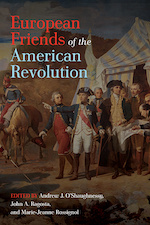Today, we are happy to bring you our conversation with Andrew J. O’Shaughnessy, John A. Ragosta, and Marie-Jeanne Rossignol, editors of European Friends of the American Revolution:
What inspired you to edit this book?
The book is the result of a very successful conference, held at Mount Vernon, to coincide with the visit of the Hermione, a reconstruction of the ship in which the Marquis de Lafayette sailed to America in 1780. It focuses on the importance of America’s European allies and the global war to the success of the American Revolution. The majority of the contributions are written by scholars from outside the United States; some translated here introduce the work of these European scholars on the American Revolution. The conference, and the book, also celebrate the renewed focus on an expanded Atlantic history and honor the groundbreaking work of Jacques Godechot and Robert R. Palmer.
What did you learn and what are you hoping readers will learn from your book?
The book provides fresh insights into the America Revolution, the French Revolution, and diplomatic and military history. For example, the first chapter explains how France, to encourage support of the American cause, invented a patriotic America distinguished from the hated British-American from the recently-ended Seven Years’ War. Those Americans then became a model for the new patriotic French revolutionary. Throughout, the volume introduces similar new understandings. Countries that have been less traditionally connected with the American Revolution, such as Russia, Spain, the Netherlands, and Portugal, are each considered. The book also explores overlooked sources such as French logbooks during major sea battles. It enlarges our knowledge of the war and period, reminding us of the crucial role of European allies in the American Revolution’s successful outcome.
What surprised you the most in the process of editing the book?
Of course, preparing an edited volume is always a challenge. With so many well-established scholars and a few early-career historians covering a breadth of topics, a great deal of work was needed to bring the volume together and to create common threads and effective narratives connecting the articles. In doing this work, it was surprising to be reminded, again, of how many topics are yet to be fully explored and how many topics that seem well-worn deserve some reconsideration.
What’s your favorite anecdote from your book?
At a very late stage in the production of the book, we realized that maps present in one of the chapters could not be used for reasons of copyright and issues with reproduction, so we required the assistance of a historical cartographer who sent the beautiful maps more rapidly than we thought. We were relieved!
What’s next?
The book confirmed our feeling that the history of the American Revolution is still worth being investigated and offers avenues for major historical discussions. Each of us is pursuing our own next projects: Andrew is writing a co-authored book with Trevor Burnard entitled, An Imperial History of the American Revolution. John’s new book concerning the crisis of 1798-1799 and creation of a “loyal opposition,” focusing on Patrick Henry’s role, is forthcoming from UVA Press in August 2023. For her part, Marie-Jeanne has just published a book on antislavery thought in the United States between 1754 and 1830; this of course investigates the deep connections between antislavery thought and the principles of the American Revolution. She is currently working on a book on Tocqueville’s America.




